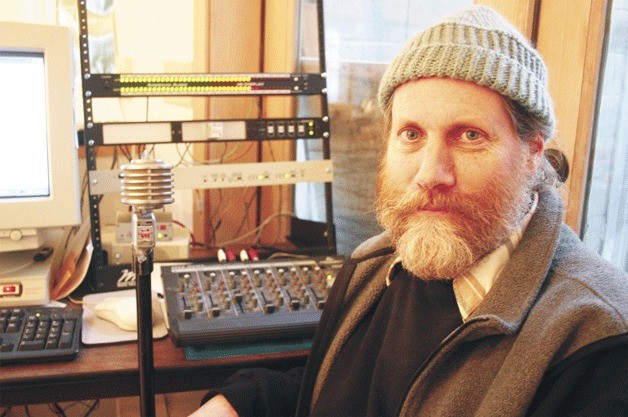Look, up in the sky. It’s a bird, it’s a plane, it’s — Mayor Paul Samuelson!
The operator of a miniscule radio station featuring old-time broadcasts such as “The Cisco Kid,” “I Was a Communist for the FBI,” “Jungle Jim,” “Space Patrol” and “Inner Sanctum” plans to expand to include one of the South End’s longest-running melodramas, “The Langley City Council.”
“I like to know what’s going on, and a lot of other people do too,” George Springer said Monday. “I figure the more access people have, the better.”
As soon as he raises $600 for a few additional pieces of equipment, Springer plans to broadcast live regular sessions of the city council, which meets the first and third Mondays of each month at 5:30 p.m. He hopes to begin shortly after the first of the year.
Springer’s four-year-old station, Langley Community Radio 1610AM, currently broadcasts an automated stream of music, news, features and community announcements around the clock.
It can be heard within a half-mile radius of its transmitter at First and Anthes downtown. Springer’s computers, microphone and control panels are across the street in a corner of his scooter shop.
Springer’s plan to transmit council meetings live is backed by the mayor, council members and several members of the community, many of whom have contributed to the cause.
“This may cut down on the number of people in attendance at the meetings,” he said of the proposed broadcasts. “But it opens it up for everybody, and that’s a good thing.”
Langley Community Radio is a Federal Communications Commission “Part 15” station with broadcast power of 100 milliwatts, or one-tenth of a watt. Part 15 allows for private citizens to own and operate stations without an FCC license.
The designation allows for AM, FM and TV, but only within its power restrictions. That means the station
can only be heard from Sandy Point to Fox Spit, the Langley waterfront, the Holmes Harbor Rod & Gun Club, the city’s sewage treatment plant on Coles Road and the Island County Fairgrounds.
When Springer’s at home just outside the Langley city limits, he can’t listen to his own radio station, although he can pick it up online.
Springer, 59, and his friend Tom Voorhees of Clinton put together LCR after helping to set up the local FM station KWPA in Coupeville. Springer said he’s the computer guy, while Voorhees is the hardware guy, specializing in radio.
He described Voorhees as a “radio activist” who through the years has helped to set up stations for diverse groups throughout the United States.
Springer, who trained as an art teacher in California, came to Whidbey Island in 1974 and opened Hellebore Glass at 308 First St. He was the community’s first glass blower.
“I figured I was young enough that I could do art for a while,” he said.
Later he branched out, opening Whidbey Island Moped next door.
Although Springer had friends in Langley, he’d never been here until he moved to the island. He said he reached the decision to relocate when his Northridge neighborhood in California developed a growing problem of home intrusions and shootings.
“I didn’t think that was a good thing,” Springer said. “It was either put bars on the windows or find someplace where not much was going on.”
So Whidbey it was, and he said he has no regrets.
“Anytime you can get more piece of mind, the better,” he said.
Springer’s radio station, which he calls his hobby, was conceived as a community conduit. Along with nostalgic programming and time, temperature and weather reports, he plays recorded music by local musicians and announcements from local businesses and groups, all for free.
He said he’ll even run free short advertisements, if the advertisers will agree to play the station in their shops “once in a while.”
“It’s truly a local phenomenon just for us,” Springer said of his station. “It’s a nice way to promote everybody.”
After Springer gets the city council meetings up and running live, he said he may extend coverage to roundtable discussions during elections, and to the meetings of city boards and commissions when controversial topics are on the table.
As part of his council coverage, Springer also plans to have at least two cordless microphones circulating throughout the room to pick up contributions from the soft-spoken on the periphery.
Down the road, Springer also envisions a talk-radio format in which callers can contribute to discussion of the current issues.
Springer said he already records city council meetings and broadcasts them the following day, and he also uploads the radio station’s content to the Web.
He agreed that some city council meetings can strain the attention span — some meetings run for four or five hours, “too long to go without food even.”
That alone, he said, is a good reason to put them on the radio.
“It makes it a lot easier,” he said. “If you’re at home, you can listen while you’re having dinner. You don’t have to go hungry or be left in the dark.”
He’s not sure if he would expand his city council coverage to TV, or online with Skype.
“It’s pretty boring seeing a bunch of people sitting around a desk,” he said. “But I guess you’d know for sure who’s talking.”
Springer offers all his radio services for free, and is currently running a pledge drive to raise money for his city council project, which he said is well worth its relatively small cost in terms of civic awareness.
“When you have more people listening, they pick up on different things,” he said. “Getting everybody’s points of view helps to digest the issue.”
LCR1610AM can also be heard at http://ww2.whidbey.net/lcr1610am/. For more information or to donate, e-mail Springer at lcr1610am@whidbey.net or call 221-5152.



